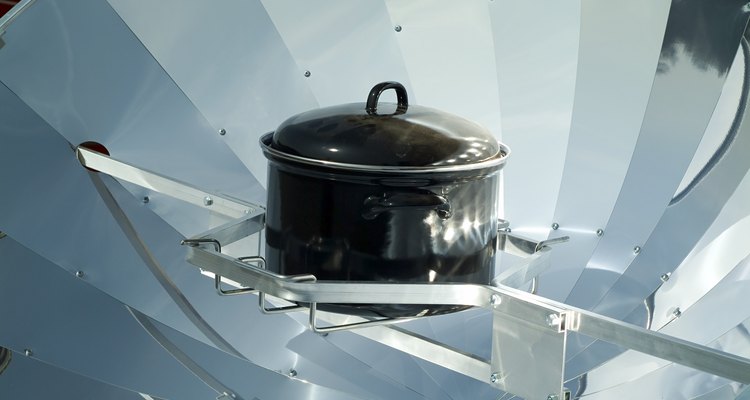
Zoonar RF/Zoonar/Getty Images
Solar cookers provide an easy, portable and clean method of cooking food and sterilizing water for people around the world. Aid organizations encourage the use of solar cookers made from simple materials in Third World countries and areas where disaster has cut off access to electricity and cooking fuels. People in more advantaged countries use solar cookers to save money and resources.
Types
Parabolic collectors resemble satellite dishes made of shiny metal. Sun shining on the metal heats it to very high temperatures. The sides of the cooker reflect the heat to the middle of the cooker, where food cooks in a pot or even directly on the metal of the cooker.
Solar box cookers, whether metal, cardboard or Styrofoam, feature an insulated box with a dark base, reflective lid and clear glass or plastic cover. The reflector directs the sun's rays into the box, where heat is absorbed by the dark bottom and trapped by the cover. Heat builds up to temperatures high enough to cook food.
Function
Solar cookers work by collecting heat from the sun and concentrating it to heat a pot or other container for cooking. Cookers feature some kind of reflector to gather and concentrate the sun's rays. Either the cooker itself or the cooking pot stores the heat. Parabolic cookers, because of their large, highly reflective surface, can reach high temperatures very quickly. Solar box cookers take longer to heat up, but retain heat for long periods of time. Cooking food in a box cooker is similar to cooking in an electric slow cooker or crock pot. The food cooks at lower temperatures over a long period. Larger cookers can reach higher temperatures, but take longer to heat up. Solar cookers can be used even in winter in the snow.
Advantages
Once the cooker is in place, the energy to make it work is free. Solar cookers produce no greenhouse gases and use no oil, gas, wood, coal or other polluting fuel. Families don't have to spend money for fuel. Solar cookers also produce no smoke or cooking fumes. Box cookers are easy to use and don't need tending. Box cookers are also simple to construct and can be made cheaply with only cardboard boxes, aluminum foil and plastic or glass. Parabolic cookers can purify large amounts of water in areas where contaminated water is a problem.
Disadvantages
Solar cookers don't work at night or on cloudy days. Parabolic cookers can get dangerously hot. You need to wear sunglasses when looking into a solar cooker, since the sun's reflected rays can hurt your eyes. Food takes a long time to cook in solar box cookers, so you have to plan meals early in the day.
Cooking
Moist foods such as soups and stews cook best in solar box cookers. You can bake quick breads, brownies and cookies in a solar cooker, but cakes and yeast breads don't turn out as well, because of the variable temperatures inside the cooker. Cooking times for foods in solar cookers varies, so experiment with recipes. Use dark metal cooking pots and pans for the best results. Cast iron and granite-ware pots work well, or paint cookware with black barbecue paint. The paint must state that the paint is food safe when dry.
Related Articles

Disadvantages of a Solar Cooker

Why Does Food Cook Faster in a Pressure ...

Appliances That Use Solar Energy

Dutch Oven Cooking Schools

Are Halogen Heat & Infrared Waves Safe ...
How to Cook With a Reverse Flow Smoker

Examples of Green Products

Types of Community Events
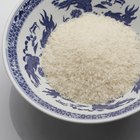
How to Cook Rice Without a Rice Cooker
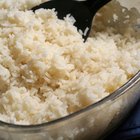
How to Cook Rice in the Cuisinart Rice ...

How to Cook With a Gas Fireplace
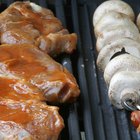
How to Use a Smoker Box for Gas Grilling
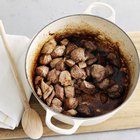
Can Ceramic Cookware Be Used on ...

What "Tools of the Trade" Cookware is ...

How to Conserve Natural Gases

Cooking With a Countertop Halogen Lamp
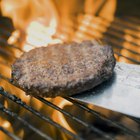
How to Convert a Brinkman Smoker From ...

The Advantages of Wok Cooking

How to Troubleshoot a Citizen Skyhawk ...
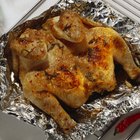
How to Cook in a Cajun Microwave Box
References
Writer Bio
Cynthia Myers is the author of numerous novels and her nonfiction work has appeared in publications ranging from "Historic Traveler" to "Texas Highways" to "Medical Practice Management." She has a degree in economics from Sam Houston State University.
Photo Credits
Zoonar RF/Zoonar/Getty Images